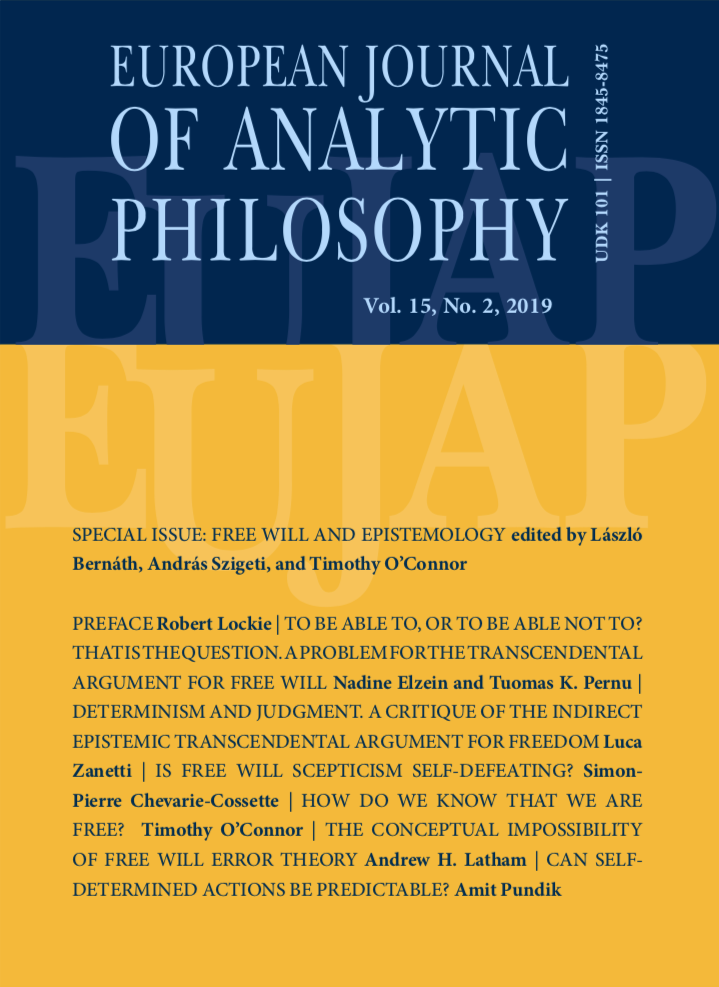View the whole issue here
- Different Arguments, Same Problems. Modal ambiguity and tricky substitutions
Rafal UrbaniakPages: 5-22 | Abstract | DOI: 10.31820/ejap.13.2.1
I illustrate with three classical examples the mistakes arising from using a modal operator admitting multiple interpretations in the same argument; the flaws arise especially easily if no attention is paid to the range of propositional variables. Premisses taken separately might seem convincing and a substitution for a propositional variable in a modal context might seem legitimate. But there is no single interpretation of the modal operators involved under which all the premisses are plausible and the substitution successful. - Explanation and Individual Essence
Marta UjvariPages: 23-42 | Abstract | DOI: 10.31820/ejap.13.2.2
In this paper I show that a novel ontic reading of explanation, intending to capture the de re essential features of individuals, can support the qualitative view of individual essences. It is argued further that the putative harmful consequences of the Leibniz Principle (PII) and its converse for the qualitative view can be avoided, provided that individual essences are not construed in the style of the naïve bundle theory with set-theoretical identity- conditions. Adopting either the more sophisticated two-tier BT or, alternatively, the neo-Aristotelian position of taking essences as natures in the Aristotelian sense, can help to evade these main charges against the qualitative view. The functional parallels with the alternative haecceitistic view of individuation and individual essence will also be considered. - Saving the Ship
John BiroPages: 43-54 | Abstract | DOI: 10.31820/ejap.13.2.3
In defending the startling claim that that there are no artifacts, indeed, no inanimate material objects of the familiar sort, Peter van Inwagen has argued that truths about such putative objects can be paraphrased as truths that do not make essential reference to them and that we should endorse only the ontological commitments of the paraphrase. In this note I argue that the paraphrases van Inwagen recommends cannot meet his condition. Read one way, they lose us some truths. Read another, they entail the existence of the very objects they are supposed to rid us of. However, we need not share van Inwagen’s distaste for the latter: to say that they exist is not to say that anything exists in addition to the simples composing them. - Evaluation of Research(ers) and its Threat to Epistemic Pluralisms
Marco ViolaPages: 55-78 | Abstract | DOI: 10.31820/ejap.13.2.4
While some form of evaluation!has always been employed in science (e.g. peer review, hiring), formal systems of evaluation of research and researchers have recently come to play a more prominent role in many countries because of the adoption of new models of governance. According to such models, the quality of the output of both researchers and their institutions is measured, and issues such as eligibility for tenure or the allocation of public funding to research institutions crucially depends on the outcomes of such measures. However, concerns have been raised over the risk that such evaluation may be threatening epistemic pluralism by penalizing the existent heterodox schools of thought and discouraging the pursuit of new ones. It has been proposed that this may happen because of epistemic bias favouring mainstream research programmes. In this paper, I claim that (1) epistemic pluralism is desirable and should be preserved; (2) formal evaluation exercises may threaten epistemic pluralism because they may be affected by some form of epistemic bias; therefore, (3) to preserve epistemic pluralism, we need some strategy to actively dampen epistemic bias. - BOOK REVIEW: A review of Perspectives on the Self, edited by Boran Berčić, 2017.
Radim BelohradPages: 79-87 | Abstract
BOOK REVIEW, A REVIEW OF PERSPECTIVES ON THE SELF, edited by Boran Berčić, 2017.

